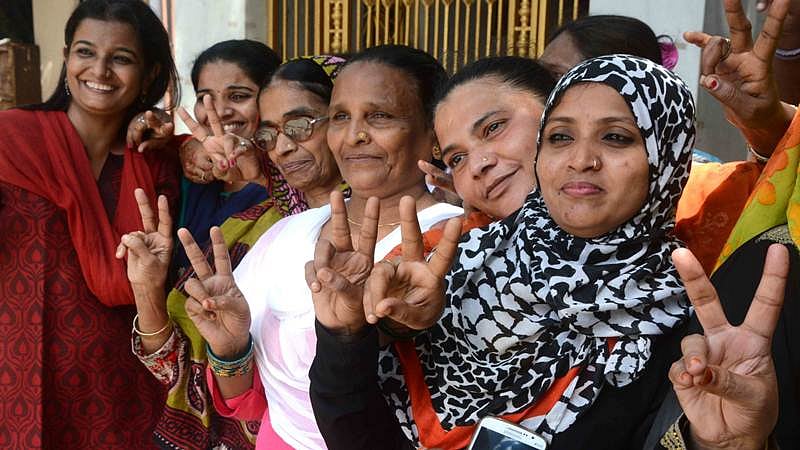The practice of instant triple talk is an enslavement of women that no civilised nation can accept. It violates the fundamental right to equality guaranteed in the Indian constitution. In a landmark majority judgment on August 24, 2017, a five-judge Constitutional Bench of the Supreme Court has rightly declared it as arbitrary, unislamic and unconstitutional.
The Parliament is expected to bring a suitable law banning the practice to restore dignity of Muslim women. The Modi Government introduced the Muslim Women (Protection of Rights in Marriage) Bill — the triple talak Bill — in Lok Sabha during the last monsoon session. Though the Bill got passed in Lok Sabha, due to the majority of NDA, the government failed to introduce the Bill in Rajya Sabha, as it could not muster support, in the face of opposition parties expressing serious concern about certain provisions of the Bill.
The objections raised by the opposition parties should have been considered. The Bill ought to have been referred to the Select Committee of Raja Sabha, where all political parties are represented, as per the established practice. A consensus about the Bill could have been reached in the Committee before presenting it in the Upper House for consideration and passage.
Instead, the government has brought an ill-conceived Ordinance on September 19, making the triple talaq a punishable criminal offence, the Opposition calling it a divisive politics to polarise opinion on communal lines. The issue assumed political significance during the election campaign in Uttar Pradesh last year with Amit Shah, demanding abolition of the triple talaq. The move paid rich dividends during the polling, getting votes from Muslim women. And now with Amit Shah expectedly calling the Ordinance ‘historic’, the ruling dispensation hopes to derive electoral dividends in the elections due in five states-Madhya Pradesh, Rajasthan, Chattisgarh, Mizoram and Telangana — in a couple of months — and in the next general elections.
The Ordinance makes the instant triple talaq illegal and void and will land the husband in jail for three years. It includes a provision for bail of the accused before the trial to be granted by the magistrate only after hearing the wife. The Ordinance does not prescribe the amount of maintenance to the victim, leaving it to the discretion of magistrate. The victim does not have the right to allowance from the property of the accused to look after her and her children. Further, the burden of proof lies with the wife, making it difficult for anyone to come forward and give evidence in her support. As the spokesman of the All India Muslim Personal Law Board (AIMPLB) Maulana Rehmani said, “If the government wanted to get it done, it should have done so by getting the Bill passed in the monsoon session of Parliament, which calumniated recently or it should have taken it to Parliament in winter session.” Another AIMPLB member Asma Zehra says, “No select committee, no discussion in Rajya Sabha, no expert opinion. It (Ordinance) won’t give any security to Muslim women and is totally against the values of democracy.” Such a contentious Bill, having far reaching consequences, should not have rushed through.
The government knows the Ordinance, in its present form, will not get passed by the Parliament in the next winter session and will lapse for want of support in Rajya Sabha. Then why this haste? It raises doubt about the government’s intention and sincerity. The opposition is crying foul. Women activists wonder why no similar provisions are made for Hindu men desertinging their wives. Asaduddin Owaisi, Chief of AIMIM, says “the prime minister should bring a law to protect Hindu women deserted by their husbands”. According to 2011 census, some 24 lakh married women were deserted by their husbands. The gender equality, freedom and dignity of women should apply to all cutting across the communities, if the women are to be truly empowered and liberated from the stranglehold of a male dominated patriarchal society.
Interestingly, the Law Commission, headed by former Supreme Court Judge B S Chauhan, in its reported submitted to the Law Ministry on August 31, 2018, said the uniform civil code is neither necessary nor desirable at this stage. The Commission observed that “the secularism cannot contradict the plurality prevalent in the country”and that the “cultural diversity cannot be compromised to the extent that our urge for uniformity itself becomes a reason for threat to the territorial integrity of the nation.” It further observed that “although polygamy is permitted within Islam, it is a rare practice among Indian Muslims, on the other hand it is frequently misused by persons of other religions who covert as Muslims solely for the purpose of solemnizing another marriage rather than Muslim themselves.” That is how we see many Hindus, particularly the celebrities and the powerful, taking second wife, in spite of the Hindu Marriage Act making bigamy illegal.
(The writer is a professor of Political Science and retired principal, who published his magnum opus ‘The Trial by Fire: Memoirs of a College Principal’.)




